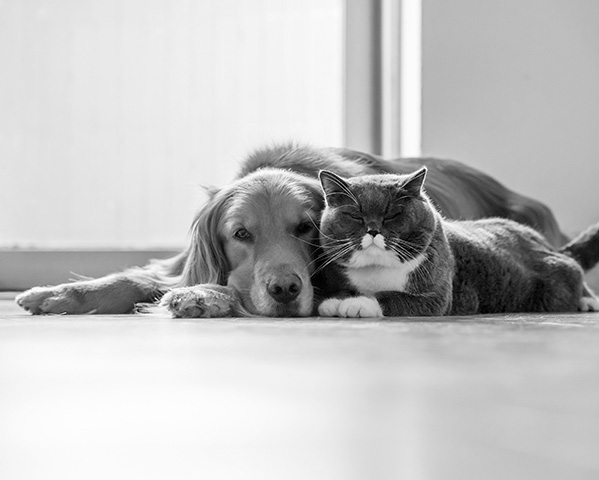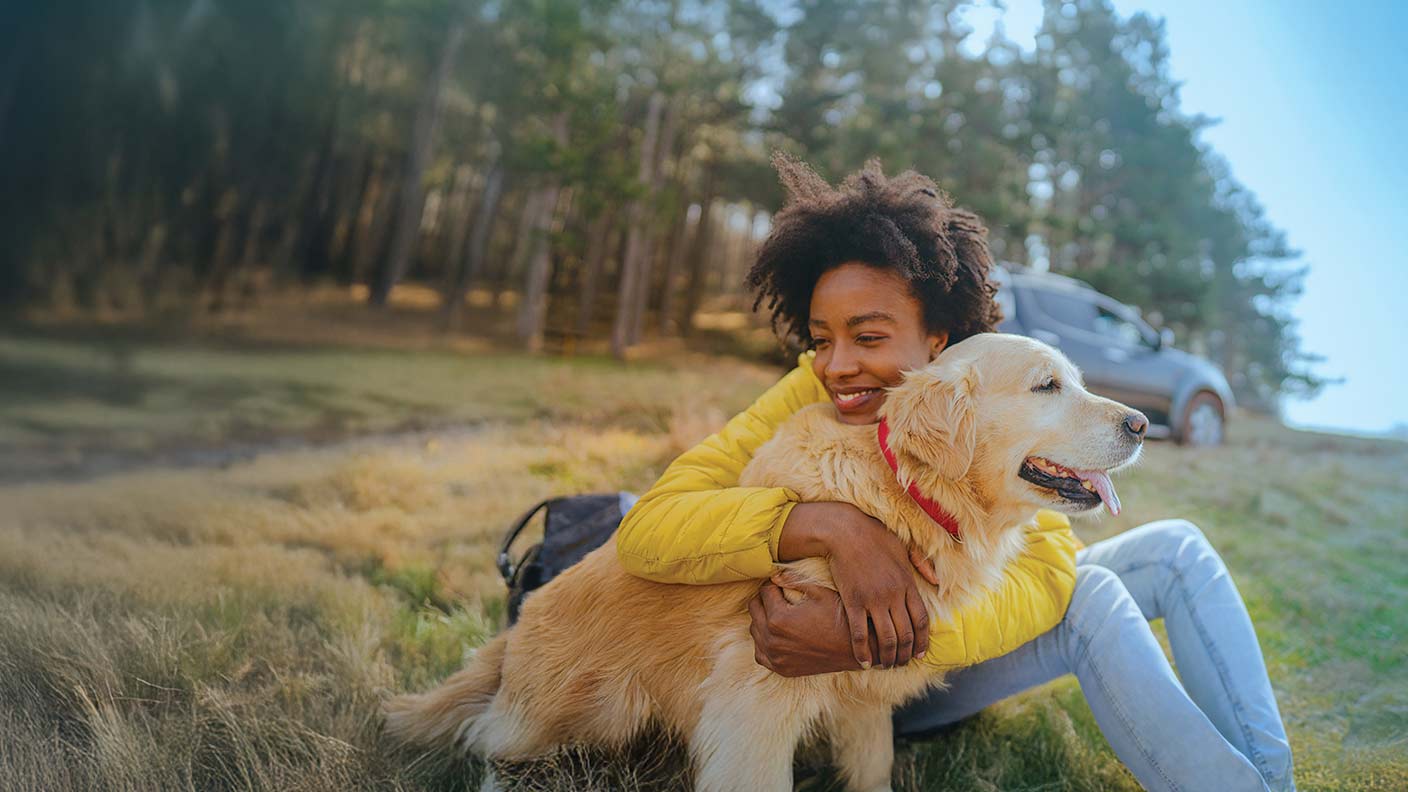Published: March 2025
Content reviewed and verified by Doctor of Veterniary Medicine, Dr Bolu Eso †
Nipping and biting
Nipping is one of the most infamous stages of puppy development, when your little pup turns into a demon after any ankle that’s brave enough to walk past. Some biting during play is normal – it’s how they’re used to playing with their littermates. While this is frustrating, it’s a normal puppy behaviour – and it’s not usually anything to worry about.
To prevent biting, you can establish playing boundaries. Praise and treat good behaviour and stop playing if it gets too rough. If your pup accidentally nips you, say ‘ouch’ sharply and pull away. This should be enough to surprise them into stopping. If they continue, turn around and move away. You may even need to leave the room. Eventually your pup will learn that when they use their teeth, the fun stops.
Chewing
Chewing is a side-effect of teething – chomping down on your sofa leg may be giving their gums some much needed relief. It can sometimes be associated with boredom too, but as long as their needs are met and they have enough exercise and playtime, it’s likely the former. But chewing can still lead to damaged furniture, shoes and clothes.
In order to manage this puppy behaviour you can:
- Give them outlets for healthy chewing – their behaviour is similar to teething in human babies. Discourage them from using hands by offering a toy instead.
- Puppy proof your home and furniture – remove anything you don’t want slobbered from places your dog can access, or use puppy gates to create a safe zone for playing in.
Lunging and jumping up
Puppies naturally lunge and jump up to get to things or people they want to interact with. This is a normal puppy behaviour as they don’t have impulse control and just want to learn about the world around them.
To keep their pawprints from people’s legs or your countertops, your pup needs lots of training. When other people interact with your dog, ask them not to engage with your pup until your furball is behaving properly. With this positive reinforcement, they’ll soon learn that they only get fuss when all four paws are on the ground.
Barking
Most pups will go through a barking phase. This development stage may be a little loud, but there are ways to train them out of it. Understanding this puppy behaviour is important. You need to try and establish why your puppy is barking. If all their needs are met and you don’t think it’s related to fear or anxiety, it could be for attention or to test their boundaries.
The best way to manage this puppy behaviour is to ignore the barking. Instead focus on positive reinforcement and reward your puppy when they’re quiet. Otherwise, they’ll pick up on your behaviour and may learn to bark for attention. Never punish your dog for barking, as this could result in fear.
Separation anxiety
It’s a normal puppy behaviour to want to be close to you – they're a part of the family after all. As cute as this idea is, it can become problematic if your pup is anxious or stressed when left alone for short periods. Separation anxiety comes from their fear of being alone. Dogs are social creatures – and don’t understand why they can’t do everything with their best friend.
Manging this puppy behaviour needs gradual training. You need to slowly build up the amount of time your puppy can manage. This can involve leaving the room for a few seconds and rewarding your pup if they don’t cry. Then increase the time.
Crate training can also be a helpful tool for helping this puppy behaviour. Using your puppy’s safe space may help them to feel less anxious. It’s healthy to teach your puppy how to be comfortable with alone time.
Uncomfortable being handled
Your pup will need to be handled by many people throughout their stages of puppy development and adult life, like vets, dog groomers, friends, and family. It’s important for your pup and everyone around them that they get used to this. Sometimes, you might notice your dog seems uncomfortable as it’s unfamiliar to them or they could be scared of getting hurt.
To manage this puppy behaviour, they need to be handled gently and gradually. Get your pup used to being touched on their paws, mouth and ears. While doing so, be aware of your puppy’s body language, as you don’t want to risk scaring them and making them more fearful. Reward them with lots of treats along the way and work on building comfort and trust.
Pulling on the lead
Remember that the world is brand new to pups, so it’s normal for them to get excited and pull to try and experience it all. This puppy behaviour just happens as they haven’t learnt the right way to walk yet.
To stop your puppy pulling, you might want to train loose lead walking. Here’s an overview of how to get started:
- Start the training in the house with your puppy on their harness.
- Reward and praise your pup for staying close by.
- Then walk around and keep praising them for being by your side.
- If the lead tightens, stop walking immediately. Stay still and quiet and don’t move until the lead is slack again.
- Don’t pull back or tell your dog off.
- If they don’t turn back to you, try walking a couple of steps in a different direction to try and regain their attention.
- Keep rewarding your pup for good behaviour!
Accidents in the house
Toilet training is a big part of training a puppy. Your puppy is likely to have some accidents when they’re young, until they’ve learned where to go. Try not to get disheartened – it can take a few months (with the odd accident) before they’re fully housetrained.
To manage this puppy behaviour, try these tips:
- Show your puppy where they should be going and reward them when they go the toilet in the right place.
- Give them lots of chances to go to the loo outside.
- Learn your puppy’s body language when they need the toilet, so you can spot the signs they need to go outside.
- Don’t tell your puppy off for going indoors, as this could scare them and make the situation worse.
Ignoring you
Puppies test boundaries, just like children. If your puppy ignores you, it’s probably because they’ve found something more interesting – whether that’s a squirrel in a tree or someone walking past the window.
To manage this puppy behaviour, you need to make yourself the most interesting thing. Do lots of treat-based rewarding and recall training in the house, so whenever you call your pup, they’re excited to come back to you. Start small and build up, so your puppy learns to associate listening and coming back with rewards.
Frequently asked questions
What is the hardest stage of a puppy?
All puppy development stages are rewarding – but they do have their challenges! Some say that puppy adolescence is the trickiest (six to 18 months). Your cute bundle of fun is becoming a teenager – and as with humans that can be a handful.
Puppy hormones can cause behaviour changes, and you may notice they have crazy bursts of energy and more inappropriate chewing.
At what age are puppies the naughtiest?
Your puppy may get quite cheeky around four to five months. It may seem like they’ve worked out how to push your buttons and they might start ignoring your instructions. Regular puppy training is essential to keep up good habits.
What is the naughtiest breed of puppy?
All puppy breeds have their own individual quirks. Some breeds are more known for being very energetic and working breeds may require more training to keep them stimulated. Whichever breed you choose, just make sure you have the time to devote your love and attention to helping them grow into a happy and healthy dog.
†The contents of this page have been verified by Dr Bolu Eso, a Doctor of Veterinary Medicine, an experienced vet and TV star. Dr Bolu is a member of the Royal College of Veterinary Surgeons, the British Veterinary Association and the American Veterinary Medical Association. He studied Veterinary Medicine at the University of Veterinary Medicine in Budapest. He has worked in Veterinary Practices in rural Kent and London. Bolu specialises in small animal medicine and is working towards specialising in surgery. He has featured in shows such as the BBC's Pooch Perfect and Channel 4's Fur Babies.

Browse our guides
Choose from our list of helpful guides and information.

Explore dog breeds
Find out how to keep your dog healthy and happy.

Cat breed guides
How to care for your cat, common health problems and more.
Terms and conditions
Important Information
* The discount is based on information related to you and the Sainsbury’s and Sainsbury’s Bank transactions linked to your Nectar account. For more information on how we use your data, go to sainsburysbank.co.uk/privacy
Sainsbury's Bank plc, Registered Office, 33 Charterhouse Street, London, EC1M 6HA (registered in England and Wales, no 3279730) is authorised by the Prudential Regulation Authority and regulated by the Financial Conduct Authority and the Prudential Regulation Authority (register no. 184514).
Sainsbury's Supermarkets Ltd is an appointed representative of Sainsbury's Bank plc. Sainsbury's Bank plc acts as an introducer to Pinnacle Insurance Ltd who is authorised by the Prudential Regulation Authority and regulated by the Financial Conduct Authority and the Prudential Regulation Authority (register number 110866). Registered office: 4th Floor, Limelight, Elstree Way, Borehamwood, Hertfordshire, WD6 1JH. Sainsbury’s Bank Pet Insurance is arranged, administered and underwritten by Pinnacle Insurance Ltd. Sainsbury's Bank plc and Pinnacle Insurance Ltd are not part of the same corporate group.
We do not provide personal recommendations to customers.
